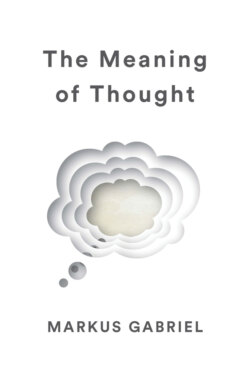Читать книгу The Meaning of Thought - Markus Gabriel - Страница 11
Notes
Оглавление1 * Words appearing in bold type appear in the Glossary at the end of the book.
2 1. In the main body of the text, I define bold expressions as precisely as possible. The definitions are also collected in a glossary at the end of the book to provide a clear overview of the most important concepts I’m working with.
3 2. The questions of what we owe ourselves and one another, and of what in general is truly significant, are central to two of the most important positions in current philosophical ethics: that of Thomas M. Scanlon (b. 1944) and that of Derek Parfit (1942–2017). See Thomas M. Scanlon, What We Owe to Each Other (Cambridge, MA: Harvard University Press, 2000); Derek Parfit, On What Matters, 3 vols (Oxford: Oxford University Press, 2011–16).
4 3. For a more detailed account, see Markus Gabriel, Neo-Existentialism (Cambridge: Polity, 2018) and I am Not a Brain (Cambridge: Polity, 2017).
5 4. Luciano Floridi, The Philosophy of Information (Oxford: Oxford University Press 2011).
6 5. Markus Gabriel and Frank Thelen, ‘Schöne neue Welt?’, Philosophie Magazin 02 (2018), pp. 58–65.
7 6. Jean Baudrillard, Simulacra and Simulation, trans. Sheila Faria Glaser (Ann Arbor: University of Michigan Press, 1994).
8 7. Immanuel Kant, ‘On the Different Races of Human Beings’, in Kant, History, Anthropology and Education, trans. Mary Gregor, Paul Guyer, Robert B. Louden, Holly Wilson, Allen W. Wood, Gunther Zöller and Arnulf Zweig (Cambridge: Cambridge University Press, 2007), p. 93. The ‘Negro’ is therefore meant to be ‘strong, fleshy, supple, but who, given the abundant provision of his motherland, is lazy, soft and trifling.’ Among other practices, Kant here justifies the introduction of ‘Negroes’ as slaves, as the ‘red slaves (Americans)’ ‘are too weak for field labour, for which one uses Negroes.’ He believes that ‘all Negroes stink’ on account of the putative effects of ‘phosphorous acid’ on their skin.
9 8. Caroli Linnaei Systema naturae: A Photographic Facsimile of the First Volume of the Tenth Edition, 1758 (London: British Museum, 1939). On this, see Gabriel, I am Not a Brain.
10 9. See Plato, The Last Days of Socrates: Euthyphro, Apology, Crito, Phaedo, trans. Hugh Tredennick and Harold Tarrant (London: Penguin, 2003), 20e–23c.
11 10. Jean-Paul Sartre, Being and Nothingness, trans. Sarah Richmond (New York: Routledge, 2018), p. 577.
12 11. Durs Grünbein, Zündkerzen (Berlin: Suhrkamp, 2017), p. 132.
13 12. Saul A. Kripke, Naming and Necessity (Cambridge, MA: Harvard University Press, 1980), pp. 20–1.
14 13. Georg Ephraim Lessing, Die Erziehung des Menschengeschlechts und andere Schriften (Stuttgart: Reclam, 1980).
15 14. Peter Sloterdijk, You Must Change Your Life, trans. Wieland Hoban (Cambridge: Polity, 2013), p. 451.
